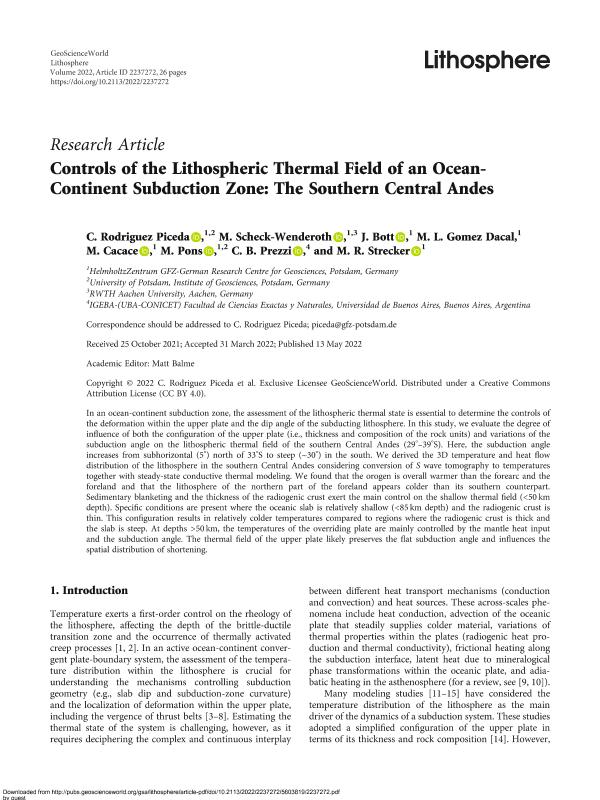Mostrar el registro sencillo del ítem
dc.contributor.author
Rodriguez Piceda, Constanza

dc.contributor.author
Scheck Wenderoth, Magdalena
dc.contributor.author
Bott, Judith
dc.contributor.author
Gómez Dacal, María Laura

dc.contributor.author
Cacace, M.
dc.contributor.author
Pons, Michaël
dc.contributor.author
Prezzi, Claudia Beatriz

dc.contributor.author
Strecker, Manfred
dc.date.available
2023-07-12T15:37:26Z
dc.date.issued
2022-05-13
dc.identifier.citation
Rodriguez Piceda, Constanza; Scheck Wenderoth, Magdalena; Bott, Judith; Gómez Dacal, María Laura; Cacace, M.; et al.; Controls of the Lithospheric Thermal Field of an OceanContinent Subduction Zone: The Southern Central Andes; GeoScienceWorld; Lithosphere; 2022; 1; 13-5-2022; 1-26
dc.identifier.issn
1941-8264
dc.identifier.uri
http://hdl.handle.net/11336/203494
dc.description.abstract
In an ocean-continent subduction zone, the assessment of the lithospheric thermal state is essential to determine the controls of the deformation within the upper plate and the dip angle of the subducting lithosphere. In this study, we evaluate the degree of influence of both the configuration of the upper plate (i.e., thickness and composition of the rock units) and variations of the subduction angle on the lithospheric thermal field of the southern Central Andes (29°–39°S). Here, the subduction angle increases from subhorizontal (5°) north of 33°S to steep (~30°) in the south. We derived the 3D temperature and heat flow distribution of the lithosphere in the southern Central Andes considering conversion of S wave tomography to temperatures together with steady-state conductive thermal modeling. We found that the orogen is overall warmer than the forearc and the foreland and that the lithosphere of the northern part of the foreland appears colder than its southern counterpart. Sedimentary blanketing and the thickness of the radiogenic crust exert the main control on the shallow thermal field (<50 km depth). Specific conditions are present where the oceanic slab is relatively shallow (<85 km depth) and the radiogenic crust is thin. This configuration results in relatively colder temperatures compared to regions where the radiogenic crust is thick and the slab is steep. At depths >50 km, the temperatures of the overriding plate are mainly controlled by the mantle heat input and the subduction angle. The thermal field of the upper plate likely preserves the flat subduction angle and influences the spatial distribution of shortening.
dc.format
application/pdf
dc.language.iso
eng
dc.publisher
GeoScienceWorld
dc.rights
info:eu-repo/semantics/openAccess
dc.rights.uri
https://creativecommons.org/licenses/by-nc-sa/2.5/ar/
dc.subject
Southern Central Andes
dc.subject
Lithosphere
dc.subject
thermal field
dc.subject.classification
Geoquímica y Geofísica

dc.subject.classification
Ciencias de la Tierra y relacionadas con el Medio Ambiente

dc.subject.classification
CIENCIAS NATURALES Y EXACTAS

dc.title
Controls of the Lithospheric Thermal Field of an OceanContinent Subduction Zone: The Southern Central Andes
dc.type
info:eu-repo/semantics/article
dc.type
info:ar-repo/semantics/artículo
dc.type
info:eu-repo/semantics/publishedVersion
dc.date.updated
2023-07-05T12:24:14Z
dc.identifier.eissn
1947-4253
dc.journal.volume
2022
dc.journal.number
1
dc.journal.pagination
1-26
dc.journal.pais
Estados Unidos

dc.journal.ciudad
McLean
dc.description.fil
Fil: Rodriguez Piceda, Constanza. German Research Centre for Geosciences; Alemania
dc.description.fil
Fil: Scheck Wenderoth, Magdalena. German Research Centre for Geosciences; Alemania
dc.description.fil
Fil: Bott, Judith. German Research Centre for Geosciences; Alemania
dc.description.fil
Fil: Gómez Dacal, María Laura. German Research Centre for Geosciences; Alemania. Consejo Nacional de Investigaciones Científicas y Técnicas; Argentina
dc.description.fil
Fil: Cacace, M.. German Research Centre for Geosciences; Alemania
dc.description.fil
Fil: Pons, Michaël. German Research Centre for Geosciences; Alemania
dc.description.fil
Fil: Prezzi, Claudia Beatriz. Consejo Nacional de Investigaciones Científicas y Técnicas. Oficina de Coordinación Administrativa Ciudad Universitaria. Instituto de Geociencias Básicas, Aplicadas y Ambientales de Buenos Aires. Universidad de Buenos Aires. Facultad de Ciencias Exactas y Naturales. Instituto de Geociencias Básicas, Aplicadas y Ambientales de Buenos Aires; Argentina
dc.description.fil
Fil: Strecker, Manfred. German Research Centre for Geosciences; Alemania
dc.journal.title
Lithosphere
dc.relation.alternativeid
info:eu-repo/semantics/altIdentifier/url/https://pubs.geoscienceworld.org/gsa/lithosphere/article/2022/1/2237272/613514/Controls-of-the-Lithospheric-Thermal-Field-of-an
dc.relation.alternativeid
info:eu-repo/semantics/altIdentifier/doi/https://doi.org/10.2113/2022/2237272
Archivos asociados
